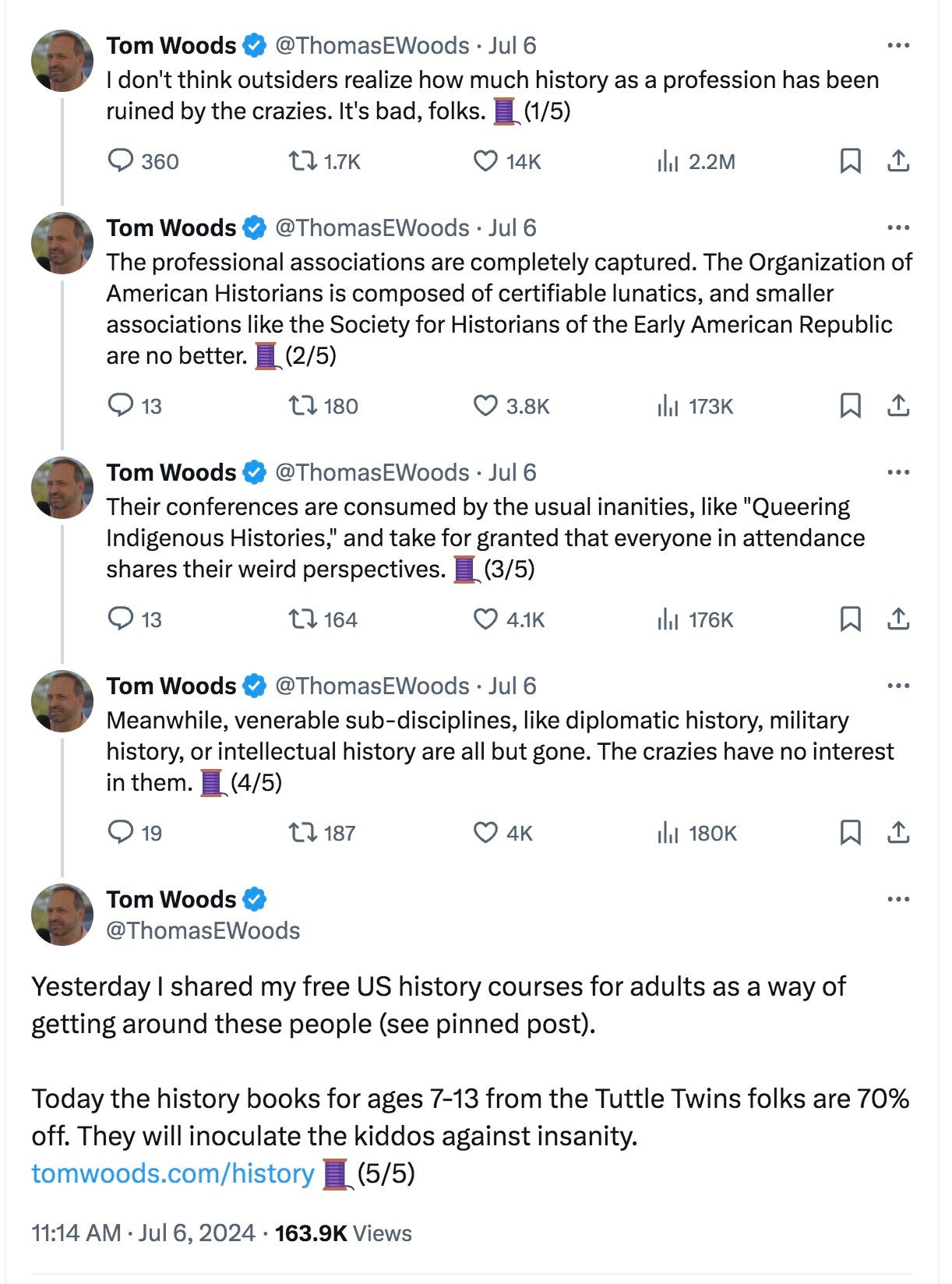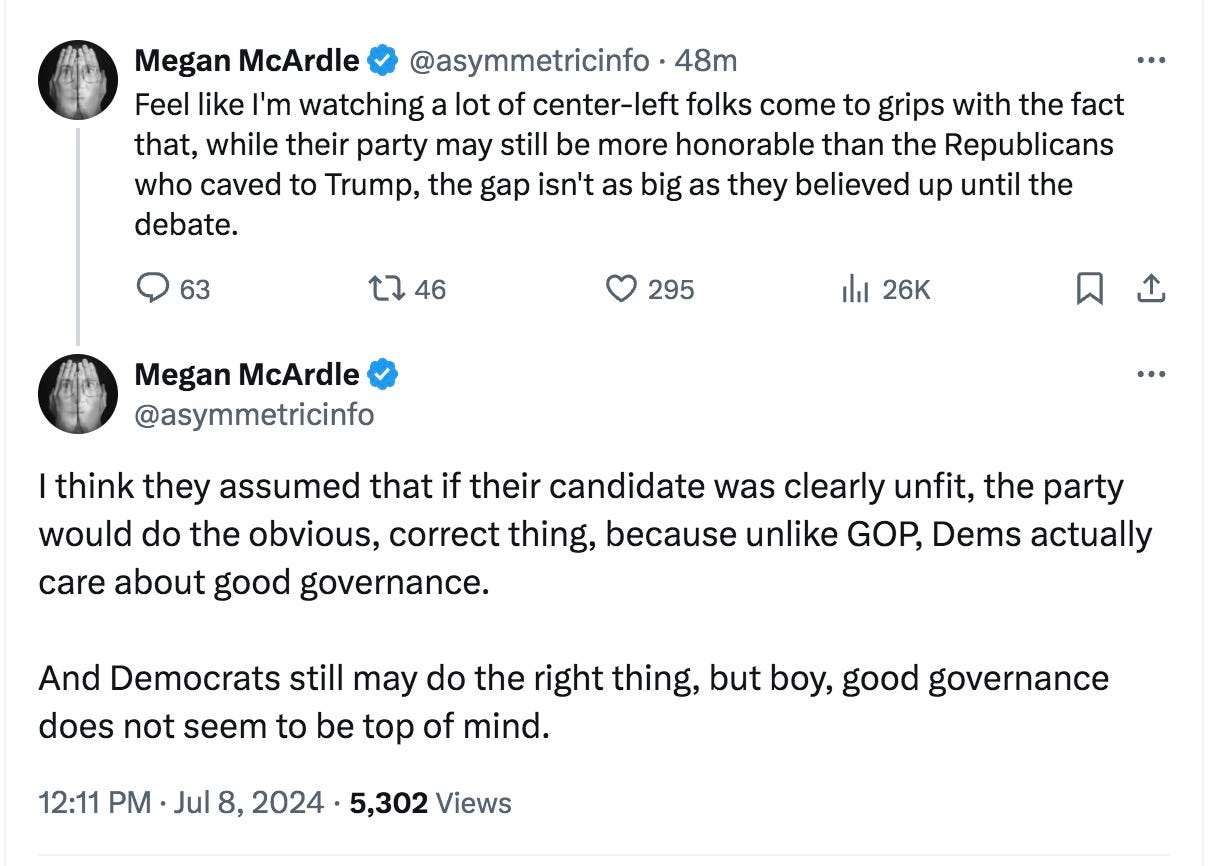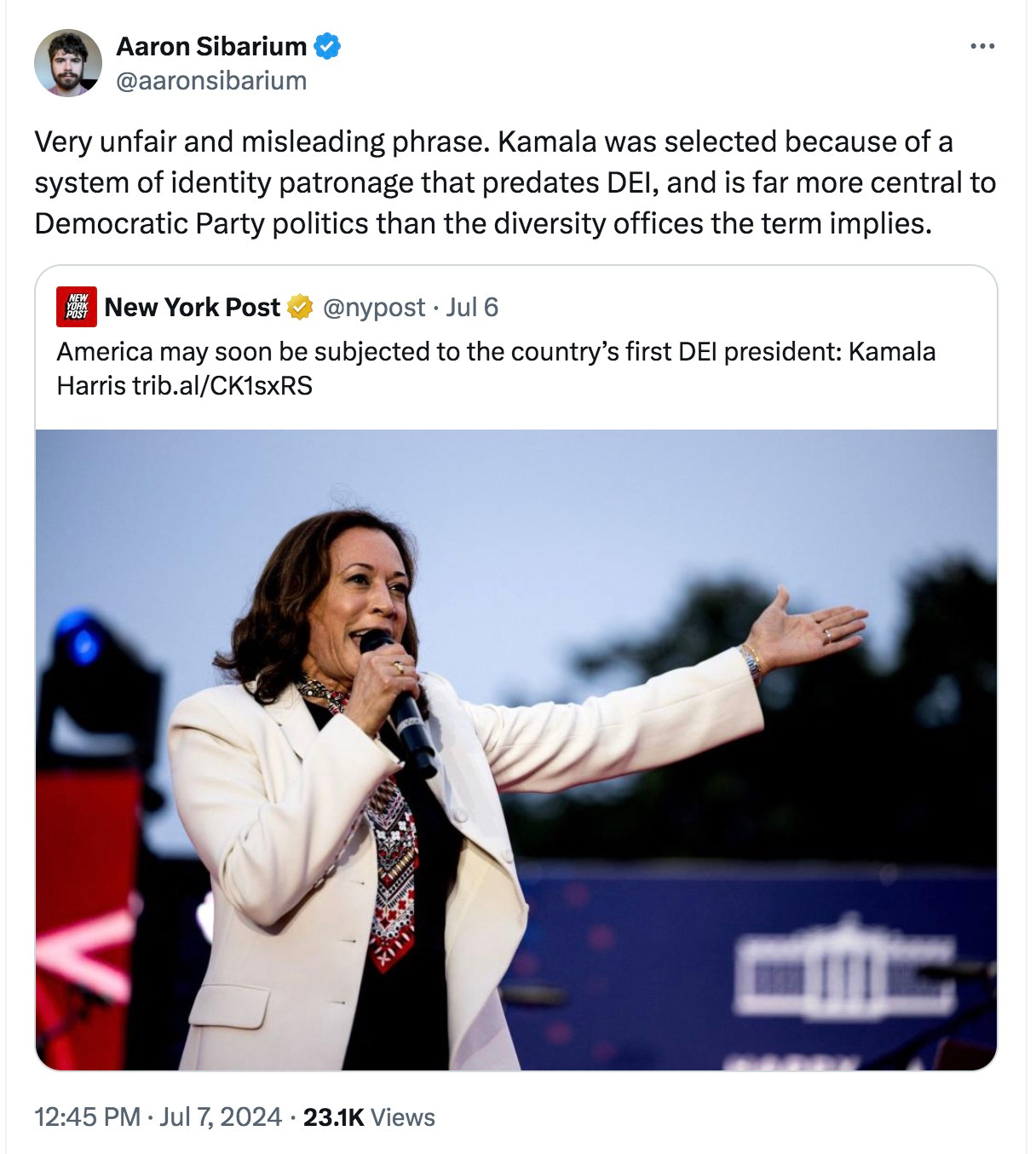E-Pluribus | July 8, 2024
The friend of my enemy has cooties; discrimination remains the essence of DEI; and celebrating the most revolutionary revolution.
A round-up of the latest and best musings on the rise of illiberalism in the public discourse:
Kevin D. Williamson: The Politics of Cooties, Again
At The Dispatch, Kevin Williamson keeps hoping the adults in the political room will take charge, but the kids just keep screaming about cooties. Compromise, particularly in a pluralistic society (e Pluribus unum and all that,) is often what makes problem solving possible. Williamson says politicians need to get their knee-jerk reactions under control and support ideas that are worthwhile, with less regard for who came up with them.
I have written before—too much already, I think—about the politics of cooties. The politics of cooties is what makes compromise and consensus-building impossible in Washington: the notion that an idea, or a piece of legislation, or even a figure of speech becomes infected when it is taken up by the other side, by … them. That was the case made against that self-abasing dope from California who used to be speaker of the House by that beady-eyed dope from Florida who led the effort to oust him: that he relied on Democratic support to get certain things done.* That’s the case the beady-eyed dope from Georgia is trying to make against a gutless dope from Louisiana currently serving as speaker of the House: You can’t use Democrats’ votes to pass a bill—those votes have cooties!
Getting members of the other party to support one’s own priorities in Congress once was a sign that you were what the old-timers used to call “good at politics.” If you happened to be the speaker of the House with, say, a six-vote majority in a party populated partly by gap-toothed yokels from Toad Suck, Arkansas—actually, the gentleman who represents Toad Suck seems like a pretty normal old-fashioned Republican, a former president of the Little Rock Rotary Club and chairman of the local chamber of commerce, but you know what I mean—then you could avoid being held hostage by the dumbest and most intransigent members of your own party. How? By giving a little something to the other party. By passing bills that were (if you were really good) 80 percent stuff you cared about and 20 percent stuff they cared about. Being in the majority still meant mostly getting your way, but having 50 percent plus one didn’t make you a temporary dictator. Everybody’s bread got buttered, which wasn’t always great for public finances but helped to get things done.
[. . .]
You’d be surprised how much this kind of thing infests the political world—including the nonprofit and campaign world—even at the operational level. I’ve seen substantial contracts awarded to perfectly nice people not particularly good at the task at hand over better-qualified alternatives because the nice guys have the right kind of politics, because they were on the right side, the right sort of people. That only makes sense from a cooties-centric point of view.
Read the whole thing.
John Sailer: How DEI Becomes Discrimination
Whatever the intentions of DEI, John Sailer at The Wall Street Journal explains how discrimination is the inevitable result. In spite of the Supreme Court’s recent decision, Sailor says DEI remains entrenched in American universities, and they’re not even being that subtle about it.
In Students for Fair Admissions v. Harvard (2023), the Supreme Court held that colleges and universities couldn’t engage in racial discrimination in the name of diversity.
[. . .]
Yet there is evidence that many universities have engaged in outright racial preferences under the aegis of DEI. Hundreds of documents that I acquired through public-records requests provide a rare paper trail of universities closely scrutinizing the race of faculty job applicants. The practice not only appears widespread; it is encouraged and funded by the federal government.
At Vanderbilt University Medical Center, a large hiring initiative targets specific racial groups—promising to hire 18 to 20 scientists “who are Black, Latinx, American Indian, and Pacific Islander.” Discussing a related University of New Mexico program, one professor quipped in an email, “I don’t want to hire white men for sure.”
Both initiatives are supported by the National Institutes of Health through its Faculty Institutional Recruitment for Sustainable Transformation program, or First. The program gives grants for DEI-focused “cluster hiring” at universities and medical schools, promising eventually to spend about a quarter-billion dollars.
A key requirement is that recipient institutions heavily value diversity statements while selecting faculty. The creators of the program reasoned that by heavily weighing commitment to DEI, they could prompt schools to hire more minorities but without direct racial preferences. That’s the rationale behind DEI-focused “cluster hiring,” an increasingly common practice in academia. The documents—which include emails, grant proposals, progress reports and hiring records—suggest that many NIH First grant recipients restrict hiring on the basis of race or “underrepresented” status, violating NIH’s stated policies and possibly civil-rights law.
[. . .]
[O]ther universities signaled to NIH that they also intended to engage in race and sex preferences. Northwestern University’s program, which focuses on areas like cancer and cardiovascular health, promises to hire faculty from “underrepresented groups.” Its grant proposal suggests this excludes one particular group: “Our faculty development programming intentionally seeks to elevate URG”—underrepresented group—“faculty to equal privilege with white men in academia.”
Records repeatedly show NIH First grantees following through on their promises. In a letter of support for Florida State University’s project, that university’s associate vice president for human resources declared, “I firmly believe in and reaffirm this project’s mission to create an under-represented minority faculty cohort.”
Read it all here.
Andy Craig: Rededicating Ourselves to the Principles of the Ongoing American Revolution
The founding of America remains unique in world history. Writing at The Unpopulist, Andy Craig argues that the American Revolution refuses to be put into a box, but rather out of many political ideas came one revolution that changed the course of history and the way humans organize themselves. This unlikely outcome, Craig says, is still worth celebrating.
The American Revolution was a complex event spanning millions of individuals over several decades, each acting from a wide diversity of motives. But the ideas of the day are astonishingly well-documented and preserved. No people in history till then made such prodigious use of the printing press, turning it into the first true popular mass media. It should perhaps be no surprise that this was the nation that would go on to pioneer the telegraph, radio, television, the internet, and social media. An endless cornucopia of newspapers, pamphlets, debates, almanacs, published speeches, diaries, letters, and public declarations accompanied the Revolution, largely free from any effective attempts at censorship. This discourse is what Thomas Jefferson was referring to when he downplayed the Declaration as merely an “expression of the American mind.”
[. . .]
Understanding the principles underlying the Revolution and the complicated, seemingly contradictory, manner in which they interacted with each other is critical to understanding America and the modern world. They set in motion consequences that are still unfolding.
To wit, the Revolution was:
Liberal, in that its political theory placed a central primacy on individual liberty and freedom from oppression and coercion.
Republican, in that it rejected monarchy as superstitious tyranny in favor of a government of divided powers where a self-governing people, not a crown, were sovereign.
Democratic, in that one of its central rallying cries was to defend and expand the autonomy of popularly elected legislatures.
Traditionalist, in that it appealed to the history and laws of England for vindication of rights, specifically the English common law tradition that stretched from the Magna Carta to the Glorious Revolution, and farther back to the fall of the Roman Republic and the lessons of the ancient Greek city-states.
Progressive, in that it celebrated the radical new idea that humanity was not consigned to a fate of perpetual poverty and drudgery. Rather, it intutively recognized the possibilty, nascent at the time, of improving the human condition and quality of life through both material and moral progress.
National, in that it forged a new common American identity, dedicated to a creed of individual rights and providing a means for the common defense of those rights.
Globalist, in that it viewed the outside world not as a threat but a source of riches. It embraced free trade and disapproved of both crony corporatist mercantilism (that “cut[ting] off our trade with all parts of the world” and denied Americans essential prosperity) and anti-immigration sentiment (criticizing Britain’s king who had “endeavoured to prevent the Population of these States; for that purpose obstructing the Laws for naturalization of foreigners; refusing to pass others to encourage their Migrations hither…”).
[. . .]
Religious, in that it embraced biblical and theological justifications for this new order, emphasizing divine disapproval of tyranny and regarding freedom as a glorious gift from the creator.
Secular, in that many of its leaders were skeptical of organized religion and Christian orthodoxy. But even the religious ones envisioned a society of absolute religious freedom and secular government founded on principles not derived from or limited to any particular faith but instead grounded in universal laws of human nature.
Read it all.
Around Twitter (X)
Is History as a profession history? Thomas Woods, Jr., for one, says it’s pretty close:
Megan McArdle thinks perhaps Democrats aren’t as different from Republicans as some might be inclined to believe:
And finally, is Kamala Harris a beneficiary of DEI? Aaron Sibarium says that’s unfair and inaccurate. She’s a beneficiary of identity patronage:









